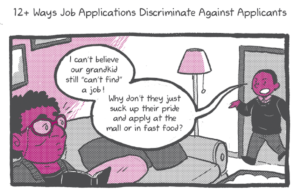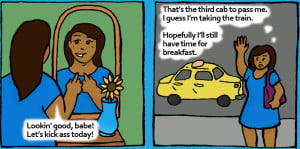(Content warning: Transphobia, cissexism, gender non-conforming and non-binary erasure)
When some of the cis people I’m friends with talk about trans people with me, they often talk about trans people who pass as cis.
They might mention Janet Mock and how they didn’t know she was trans until they looked at her Wikipedia page. Maybe they’ll talk about Caitlyn Jenner and her transition — about how many people, outside of trans and gender non-conforming circles, still see her as a man.
To most cis people, Janet Mock “passes” and Caitlyn Jenner “fails.”
Passing is the term used when a trans person can move through the world without anyone suspecting that they’re trans. Often, it is used to be a measurement of a trans person’s value.
If you pass as cis, you’re probably considered more desirable, respectable, and easier to love.
For many trans people, passing as cis is the ultimate goal of their gender presentation. Passing, of course, has its benefits — if you pass, you may face less transphobic harassment while walking down the street, and you might have a better time finding a job.
But ultimately passing is a harmful standard for trans people who do not or cannot pass for cis, especially for working-class trans people who don’t have the resources to dramatically change the way they present themselves to others.
Trans people who don’t pass may be deemed ugly or disposable by cis people because cisgender norms of gender are the ones that are validated as the default.
In fact, some trans people may shame themselves or each other for not being able to pass.
The trans people who do pass — especially if they are white, wealthy, and non-disabled — have access to the tip-tops of hierarchies and accrue social and financial capital by selling an easy-to-digest form of transness.
What happens to trans people who fail the gender exam? And what happens to gender non-conforming people and non-binary people, who may intentionally not want to pass as one binary gender or the other?
For years, many trans people have pushed back against the idea of passing. Janet Mock has noted that the idea that trans people have to pass reinforces the idea that we are naturally deceiving — that trans people are always trying to become someone rather than just be who we are.
By pushing back against the narrative of passing, trans people are challenging cisnormative standards of beauty and respectability.
But the disappointing thing is that there has been very little, if any at all, discussion about how gender non-conforming people fit into this discussion.
For many gender non-conforming people, passing never was the goal. We move ourselves away from the gender binary on purpose.
But does that make us less deserving of resources from cis people and of community from trans people?
When cis and trans people place value on passing as the quintessential and only goal, they forget the impact that it has on gender non-conforming people. They imply that the very basis of gender non-conforming identities — the non-conformity part of “gender non-conforming” — is broken.
I need all of us to discard the idea of that everyone needs to or wants to pass once and for all, for the sake of myself and other gender non-conforming people. Here’s why.
1. The Whole Idea of Passing Makes No Sense
The desire to pass for cis oftentimes comes from the conditioning that trans and gender non-conforming people receive, which teaches us that cis people are the only form of natural human existence.
Trans people are seen as abnormal because most of us don’t look like cis people — it is only after people measure us by cis standards that we are read as strange, ugly, or disgusting.
Because cisgender norms are reinforced as the default, cis people don’t have their gender placed under as much scrutiny as us trans and gender non-conforming folks.
Yet, cis people are performing their gender just as much as anyone else. They make choices about their outfits each morning (which I must say are rarely as fabulous as me and mine) —and those choices do have political implications.
When I people-watch in New York City, which sits on stolen Lenape land, I often think about what motivates these “cis men and women” to dress in certain ways, to walk with a certain stride. What motivates cis men to wear pants instead of skirts? Why are men in skirts so reviled?
Cisgender, heterosexual men wearing dresses isn’t unnatural. They just happen to not wear dresses because they are told over their whole lifetimes that dresses are reserved for girls and for those weird genderfreaks over there.
A cis man in a skirt is just as cis as a cis man in pants; cis people do not have a certain look, which is why passing for cis makes no sense for most of us.
There is no one way to look cis, because if you are cis, then whatever you look like is what cis looks like. The wardrobe choices of cis men are arbitrary, and their masculinity is so fragile that wearing a skirt — a piece of fabric — makes it crumble.
This is how we pull cisgender norms apart so we can understand how they harm us.
When the gender presentations of cis people become the norm, everything else becomes deviant and placed under suspicion. Pointing out the fallibility of cisgender presentations is important we can remind ourselves that they are constructed and can thus be disassembled.
We should be just as, if not more, suspicious of cis people’s gender as everyone is of non-cis people.
We could easily turn the idea the passing around and say that cis people are the ones that look strange, that the men need to slap on some lipstick and the women need to shave their heads.
When we, cis and trans people alike, buy into the idea of passing as the ultimate and only goal, we reinforce cisnormative ways of being. We perpetuate the idea that human beings can only exist as the colonially constructed notion of what a man and woman can be.
But the truth is that human beings don’t need to be man or woman. Human beings can be one, or both, or neither. And when we get beyond that utterly suffocating and extremely boring binary, there are explosive possibilities.
The test of passing is built on a fabricated foundation.
Cis people come in too many multitudes to be able to condense them all in one model cis person, although it’s worth noting that the people that pass the best are usually middle-class, non-disabled, white, and thin.
Cis, trans, and gender non-conforming people are measured with that narrow standard of personhood. All people are harmed by this idea that passing is the ultimate goal.
And just as cis people can exist in a multitude of being, so can trans people. Trans people should be able to be just as complex and multifaceted.
The guidelines of the test are made to be harmful towards us. And when trans people uphold the value of passing, we harm ourselves, especially the gender non-conforming people in our communities.
2. Emphasizing “Passing” is How Both Cis and Trans People Harm Gender Non-Conforming People
Many people believe that to be successfully trans, you must seamlessly transition from one binary gender to the other. Male to female, or female to male. And by the end of this transition, no one should know that you transitioned at all.
Many will say that you haven’t fully transitioned unless you’ve changed your genitals, because apparently your body dictates who you are as a person. The reality is that there are cis women who are born without vulvas, there are cis men who are born without penises, and there are intersex people born with myriad combinations of genitals, hormones, and reproductive organs.
So newsflash: our bodies are our own and only we can decide what they mean about us.
But the dominant narrative about trans people is that our final destination is the opposite gender of the one we were assigned at birth. So when gender non-conforming people deviate from this narrative, our claims to our identity are placed under question.
Prior to identifying as a gender non-conforming femme, I identified as a gay man. I had thought that I reached my final destination at 17 years old, when I told my parents that I was a guy who liked other guys. That changed when I released myself from the binds of manhood — a manhood built on European colonialism and anti-Blackness.
By removing a destination from my journey, I am free to wander wherever my imagination takes me. And that is a better feeling than manhood could ever give me.
But the result of being a person who very deliberately resists falling into one prescribed gender or the other, I may get flack from both cis and trans people.
Cis people are often confused by me or are leveraging structural violence against me. Otherwise, trans people who are invested in the binary may see me as threatening for not matching their embodiment of transness.
In other words: cis people are mad that I’m not cis enough, and trans people are mad I’m not trans enough. I guess I can’t have shit. But the truth is that I am enough, and that is not up for debate.
When both cis and trans people uphold the idea of passing as the only model of existence for non-cis people, there are barely any spaces for gender non-conforming people to find support. And when both cis and trans people reinforce the gender binary, gender nonconforming folks are left with the same violent world, regardless of whether there are a few trans women on the TV screen.
In fact, gender non-conforming people, who may identify as genderqueer, agender, or other variations of non-binary identities, can face more violence than our binary trans counterparts, according to this 2008 National Transgender Discrimination Survey.
We are more likely than binary trans people to experience physical and sexual assault and harassment by police. And a greater percentage of us work in settings that may subject us to more violence, such as in drug sales and sex work. We also have slightly higher rates of attempted suicides than trans people who identify within the binary.
This increased violence is perhaps because we often very intentionally do not pass, and are thus hypervisible to the world at large. Our gender presentation, which can feel natural to us, is threatening to anyone who defines themselves through a binary gender.
Just by presenting as we do, we undermine the mainstream narratives about both cis and binary trans people.
Our resistance is often plainly displayed, making us an easier target than people who are perceived as one binary gender or the other.
3. Trans and Gender Non-Conforming People of Color Are Unable to Fit in the Binary Anyway
Because gender is racialized, much of the ways we think about gender is filtered through whiteness. Concepts of manhood and womanhood are largely made for white bodies. White cis people are seen as the ideal of cisgender presentation in the first place.
As a result, many non-white people fail the test of gender automatically. People of color are disadvantaged just by being not white in the first place. So even cis people of color who think they are gender conforming may be less so than they believe.
The other day, a well-meaning friend of mine said to me, “I feel all Asians are girly anyway.”
To him, it was a small observation about how he perceives people who he thinks are Asian. But the statement also explains so much of how gender and race are intertwined and inseparable.
The reading of Asians, particularly East and Southeast Asians, as intrinsically more feminine than other racial groups, indicates how racism and colonialism inform the ways we think about gender.
These tropes about Asian submissiveness feed into the white patriarchal hunger for conquest. Asian women and transfeminine people are seen as exotic toys that men can throw around. And within my own family, Vietnamese cis boys and men are aspiring towards a white, colonial masculinity that they will never be able to achieve.
They are seen as failed men because they are gendered through the eyes of a white, colonial gaze.
As a Southeast Asian person, I was still perceived as femme even when I didn’t present as such by people who have learned gender the white way. I’m not afforded a blank slate that allows me autonomy around my gender identity and presentation; the starting point for my gender is decided by the way I am racialized in the settler colonial state called “America.”
People of color, whether cis, trans, or gender non-conforming already defy the gender binary just by surviving, anyway — but some of us choose to participate in reinforcing the binary that harms all of us, whether we know it or not.
Gender non-conforming people of color existing in the world, each with our own kind of radiance, is radical because we destabilize the gender binary more than anyone else.
Since people of color already threaten the binary, gender non-conforming people of color add another crucial layer of resistance.
Fighting transphobia includes fighting racism, anti-Blackness, and settler colonialism. Investing in binary ideas of “passing” is not going to end oppression for anyone.
It’s tempting to want the access and power that cis white people hold. But do we want to birth a world free from oppression, or do we want to be positioned alongside our oppressors?
***
It makes sense that many trans people want to “look cis.” Some of us don’t even know that we want to. But placing emphasis on passing is doing all kinds of hurt, and it isn’t helping us by any measure.
Rather than asking ourselves and each other to “pass” the standardized test of gender, what if we instead uplifted those who fail gender with flying colors?
What if we redirected value and highlighted those of us who destroy all norms of what is considered an acceptable gender presentation? What if we all learned to fail gender together and love ourselves for it?
[do_widget id=’text-101′]
xoài phạm is a Contributing Writer for Everyday Feminism. They are a Vietnamese femme. They are tender and dangerous. They love mangos. They have places to be and people to scare. Read their articles here.
Search our 3000+ articles!
Read our articles about:
Our online racial justice training
Used by hundreds of universities, non-profits, and businesses.
Click to learn more





















